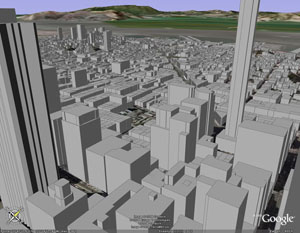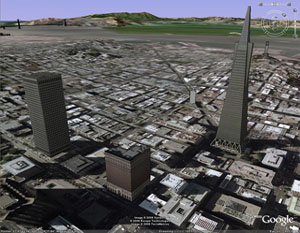Google Earth Free or Plus cannot be installed at work. See Google Earth at the office? You need Pro.
Check out the terms:
"USE OF SOFTWARE The Software is made available to you for your personal, non-commercial use only. You may not use the Software or the geographical information made available for display using the Software, or any prints or screen outputs generated with the Software in any commercial or business environment or for any commercial or business purposes for yourself or any third parties."
This is very restrictive and you are not even allowed to use the screengrabs. This is so restrictive I suspect they'll have to adjust this in the near future.
The bottom line, if you plan to use Google Earth in a commercial environment or build solutions around it, is that you must use the Pro version at $400.
The cost of this product in a commercial environment is understandable - Google have to make a living after all - and the cost seems reasonble to me. The concern for me is the fact that the terms changed to become more restrictive.
This is not unique to Google since other companies have does this in the past. The concern comes from the fact that Google have a different business model. In the past you would buy a product such as Microsoft Excel and install it on your own computer. You'd own the data and the application. What happens with the new business model that Google intends us to use whereby Google stores the data and provides the application (e.g. Google Spreadsheets). What happens if they changed the terms for these sorts of applications?
Friday, June 16, 2006
Monday, June 12, 2006
Google Earth 4 Beta Released
Download here.
The GUI is simplified and look a lot cleaner. But the coolest thing is the textured buildings.

Now becomes:

There's also a new version of KML.
(Updated: testing Office Word 2007 B2TR's editing abilities for existing posts.)
Saturday, June 10, 2006
.NET Framework 3.0
Microsoft have renamed WinFX to the .NET Framework 3.0.
Apparently, this is to reduce confusion. WinFX is built on 2.0, so now we have .NET Framework 3.0 built on .NET CLR 2.0 and hence .NET Framework 3.0 is built from .NET 2.0 compilers. Now I'm confused. I preferred the separation of the development platform from the underlying OS API. Does this mean there will be no further updates to the .NET Framework for Windows 2000?
Note that LINQ was due in .NET Framework 3.0 (as far as I understand it, LINQ requires changes to the CLR). Jason Zander indicates that LINQ support, which is part of the "Orcas" project, will appear after .NET Framework 3.0. Does this mean we'll have a further update to the .NET Framework soon after Vista ships?
Apparently, this is to reduce confusion. WinFX is built on 2.0, so now we have .NET Framework 3.0 built on .NET CLR 2.0 and hence .NET Framework 3.0 is built from .NET 2.0 compilers. Now I'm confused. I preferred the separation of the development platform from the underlying OS API. Does this mean there will be no further updates to the .NET Framework for Windows 2000?
Note that LINQ was due in .NET Framework 3.0 (as far as I understand it, LINQ requires changes to the CLR). Jason Zander indicates that LINQ support, which is part of the "Orcas" project, will appear after .NET Framework 3.0. Does this mean we'll have a further update to the .NET Framework soon after Vista ships?
Virtual Earth Interactive SDK

Microsoft have released a one-stop shop for the Windows Live Platform which includes the latest APIs, code samples etc. See dev.live.com.
One of the first examples is an interactive version of the Virtual Earth SDK - Virtual Earth Interactive SDK.
Wednesday, June 07, 2006
Subscribe to:
Posts (Atom)